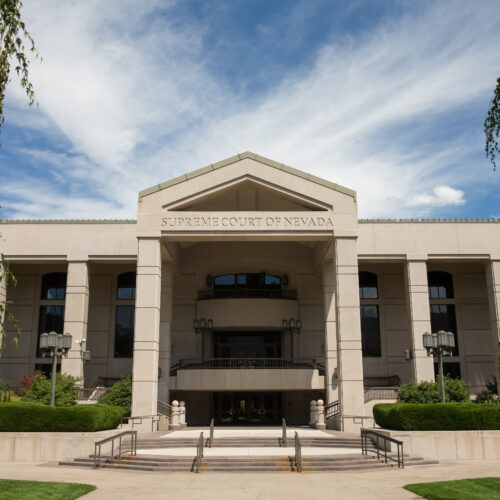Nevada Supreme Court bans flat fee contracting

Pleading the Sixth: On July 23, 2015, the Nevada Supreme Court banned the use of flat fee contracts in the provision of indigent defense services. The same order endorses the statewide commission format. Will the order force legislative change? The 6AC explains what has been happening in Nevada over the past year.
Announcing that the “competent representation of indigents is vital to our system of justice,” the Nevada Supreme Court issued an administrative order on July 23, 2015 banning the use of flat fee contracts that fail to account for extraordinary cases or trial-related expenses. The American Bar Association, Ten Principles of a Public Defense Delivery System, prohibits such flat fee contractual arrangements because they are rife with financial incentives for lawyers to do as little work on cases as possible. Generally, all trial expenses (experts, investigators, etc.) are paid out of the same flat fee meaning that a lawyer’s take home pay is negatively impacted the more outside assistance he seeks. A federal court recently called such contracting systems a “deliberate choice,” that reduces the constitutional right to counsel to “little more than a formality.” Through the administrative order, Nevada joins other states that have recently banned flat fee contracts, including Idaho and Michigan.
Why the ban is so important
Nevada statutes require all counties whose population is 100,000 or more to create a county-funded office of the public defender – Clark County (Las Vegas) and Washoe County (Reno) are the only two counties that qualify. Each of these counties also has a conflict defender office, though the Clark County Office of the Special Public Defender handles just conflict death penalty cases, other murder cases and representation of parents in termination of parental rights proceedings. An independent, coordinated assigned counsel system in Clark County handles all other conflict matters. The remaining fourteen counties and one independent city (Carson City) may, if they so desire, also establish a county public defender office – though only one other (Elko County) has done so. The rural counties may also buy into the State Public Defender system.
The State Public Defender Act of 1971 created an independent seven-member commission appointed by a diversity of factions to ensure that no single branch of government could exert undue interference on the work of the agency dedicated to representing poor people. The commission was charged with overseeing the State Public Defender system, hiring and firing the executive of the system, and setting uniform policies for the delivery of indigent defense services in Nevada’s rural counties. As originally conceived, the State Public Defender was funded through a combination of state and county funding, with the state paying for 80% of all public defender costs in the rural counties and the counties paying the remaining 20%.
Yet, only four years after creating the State Public Defender Commission, the Nevada Legislature did away with it and voted instead to make the State Public Defender a direct gubernatorial appointment (four-year term). In 1989, the legislature further compromised the ability of the State Public Defender to render effective services by demoting the position from a gubernatorial cabinet-level position to one of several intra-agency positions within the Department of Human Services. This means that the State Public Defender must now justify the office budget among all human services divisions and then have the Director of Human Services argue that budget amongst all other cabinet departments.
Over time, this arrangement resulted in the state reducing its financial commitment to the point where today participating counties pay 80% of the entire cost of the system. Counties learned that, by simply opting out of the state system, they could spend less money to provide the services and exercise local power over their public defense systems. However, this movement out of the State Public Defender system was done with no guidance whatsoever by the state (i.e., there are no standards as to how the counties must set up their systems). In most instances, the county governments established systems in which the lowest bidder is contracted to provide representation in an unlimited number of cases for a single flat fee. The attorneys are not reimbursed for overhead or for out-of-pocket case expenses such as mileage, experts, investigators, etc. Today, the state public defender serves only Carson City and White Pine County.
Approximately 80% of Nevada counties therefore currently employ flat fee contracting for all indigent defense services. And, the services provided through flat fee contracts in Nevada have been found deficient as far back as 1999 when the Nevada Supreme Court Task Force on the Elimination of Racial, Gender and Economic Bias in the Justice System determined so through a report overseen by the American Bar Association and funded through the U.S. Department of Justice, Bureau of Justice Assistance. More recently, the Court’s standing indigent defense task force submitted its report on public defense services in rural Nevada on July 14, 2014 finding fault with the delivery model and asking the court to take the action that it did.
Why reform indigent defense through court administrative orders?
Nevada has one of the most truncated legislative sessions of any state in the country, meeting for only 120 days every other year. Getting a comprehensive indigent defense reform bill through the legislature on such a schedule is difficult, at best. This past year, the Nevada Supreme Court sponsored Senate Bill 451 that, if passed, would have created a permanent independent oversight commission. The proposed commission’s 13 members would be appointed by diverse appointing authorities, with the power to promulgate and enforce standards ensuring: a) sufficient time and meeting space; b) defense counsel’s ability, training and experience match the nature and complexity of the case; c) the same defense counsel represents a defendant through the pendency of the case; d) evaluation of defense counsel to ensure that he or she meets performance standards; and e) appropriate workload of defense counsel. Though a Senate Judiciary Committee hearing was held during which Supreme Court Justice Michael Cherry testified, the session ended before any further action could be taken.
Thursday’s administrative order is just the latest effort of the Nevada Supreme Court to ensure equal justice before the law in criminal and delinquency cases. Beginning as early as 1877, the Court made the state the very first in the union to authorize the appointment of attorneys in all criminal matters, including misdemeanors, and also required the payment of attorneys for the services rendered (detailed in the 6AC report Reclaiming Justice). More recently, the Court has handed down a number of administrative orders beginning in January 2008 that, among other things: a) instituted performance standards for attorneys in trial-level adult criminal, juvenile delinquency, and appellate representation; b) removed the judiciary from the oversight and administration of indigent defense; and c) required each county to submit to the Supreme Court for approval local plans for delivering indigent defense services.
Though the orders have had significant impact on urban Nevada, and in particular Clark County (Las Vegas), thus far the administrative orders have had little impact in rural counties. The reason for this is not very complicated. As the largest county in the state, Clark County has the resources and indigent defense structure to respond to the Court’s mandates, whereas rural Nevada does not. So, for example, when the Court ordered the judiciary to be removed from the oversight and administration of indigent defense services in January 2008, Clark County could easily hire an independent assigned counsel coordinator to run the conflict panel. But the rural counties had no financial ability to hire independent contractors to administer their services.
Conclusion
The ban on flat fee contracting potentially could bring such an economic strain on the rural counties as to force the legislature to act. Indeed, the Court seems to be posturing as much. Though the order states that the Court takes no position on whether the state should fund 100% of indigent defense services in rural counties, it hints that such decisions are best raised in an actual case. However, the Court unequivocally endorses a commission approach to defender services in the administrative order suggesting that such a commission as proposed in SB 451 should be implemented by the executive and legislative branches of state government.


